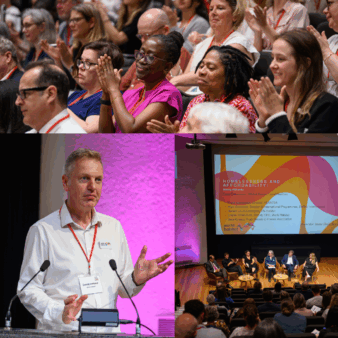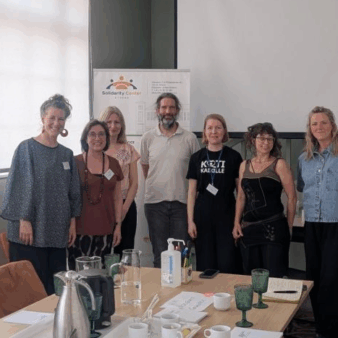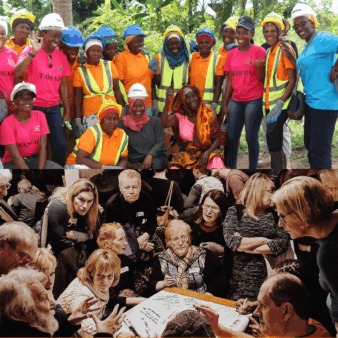
A report detailing the ongoing housing crisis for communities in the areas affected by the Beirut port blast on 4 August 2020, has been published by Public Works Studio, winner of a Gold World Habitat Award in 2021.
The report – Homelessness in the Wake of Disaster – details the repercussions of the blast, subsequent renovation processes and aid interventions that failed to provide housing security. In the absence of fair reconstruction policies, a new pattern has emerged in Beirut where NGOs have supplanted the state and implemented a new dangerous pattern of practice that threatens housing security and directly hinders equitable post-disaster rehabilitation and compensation. In response to these revelatory findings, the report calls for measures to address ongoing human rights violations while pushing for state regulatory reform that will help provide equitable housing security to post-blast residents.
Public Works Studio has outlined key change to the reconstruction Law 194/2020 to alleviate and address this crisis, some of which include:
- Amending Article 5 of Law 194/2020 to extend lease contract through the renovation period instead of just one year of renewal, adopting a zero-eviction policy, and activating role of public and local authorities in securing alternative housing;
- Integrating abandoned and vacant apartments into alternative housing programs
- Forming a coordination committee for reconstruction which would include all of the representatives of affected communities;
- Approving the lists of damages, the compensation mechanism and timetable for its distribution; and
- Ending the privilege of Solidere and other real estate companies which allows them to invest in real estate in the affected areas.
These recommendations fall within a wider call for comprehensive recovery policy that ensures the quick return of residents, focuses on rebuilding socio-economic activities, and engages victims and residents in planning, organisation, coordination and implementation.
While the above tackles immediate needs, Public Works Studio calls for necessary long-term changes to protect the population from being further marginalised, including:
- regulating the rental market by setting fair rates according to clear criteria and exclusively using national currency for rents;
- establishing eviction conditions in line with international law;
- imposing progressive taxes on real estate investors while launching housing programs that increase available and inclusive housing stock and support small owners reliant on rental income streams;
- encouraging housing cooperatives through tax exemption and potential financing;
- activating monitoring mechanisms to ensure more accountability in delivery of inclusive housing standards; and
- establishing housing projects that are in line with the local environment but can benefit poorest segments of the population.
Two years on from the blast the city is still plagued with issues that are often perpetuated by inequitable recovery efforts. Indeed, it exacerbated existing housing insecurities for vulnerable groups, including the elderly, refugees, migrants, women, and members of the LGBTQ+ community and created new challenges directly tied to pre-existing conditions. More than two-in-three (70%) migrant workers were evicted with many landlords using the excuse of renovation to evict tenants from their home without affidavit guarantee that they could return. LGBTQ+ members, without safe alternatives often found themselves living in poor housing conditions and most of the housing violation reports were from women who live alone, single mothers, or women solely looking after their families. Some landlords tried to confiscate tenants’ aid deliveries and / or evicted Syrian residents to gain access to their ration boxes.
These issues are compounded in an environment where the state has failed to ensure equitable protection of housing rights during economic, health and humanitarian crisis. In the aftermath of the explosion rent arrears accounted for over a third (38%) of the reasons to evict tenants, revealing how poorly tenants are protected following a crisis. The blast killed 200 people, injured 7000 others, and displaced some 300,000 people. It caused widespread devastation and damage to the neighbourhoods around the blast site and left more than 1,120 buildings in need of renovation. Over a year and a half on, residents in these areas are still displaced; it is estimated that only 30% of the residents of Beirut’s affected neighbourhoods have returned to their homes.
The report was compiled from a variety of sources, including from field visits and from reports submitted, Public Works Studio’s community-driven tool – the Housing Monitor. Research such as provided by this report is crucial to protecting and advocating the rights of those marginalised within Beirut’s post-blast reconstruction.
The report is available to read in Arabic or English here. You can also see their slides on the report on Instagram here.
If you are in Lebanon and need to report any housing violations and eviction threats, you can contact the Housing Monitor at 81-017-023 and info@housingmonitor.org.




Join the discussion